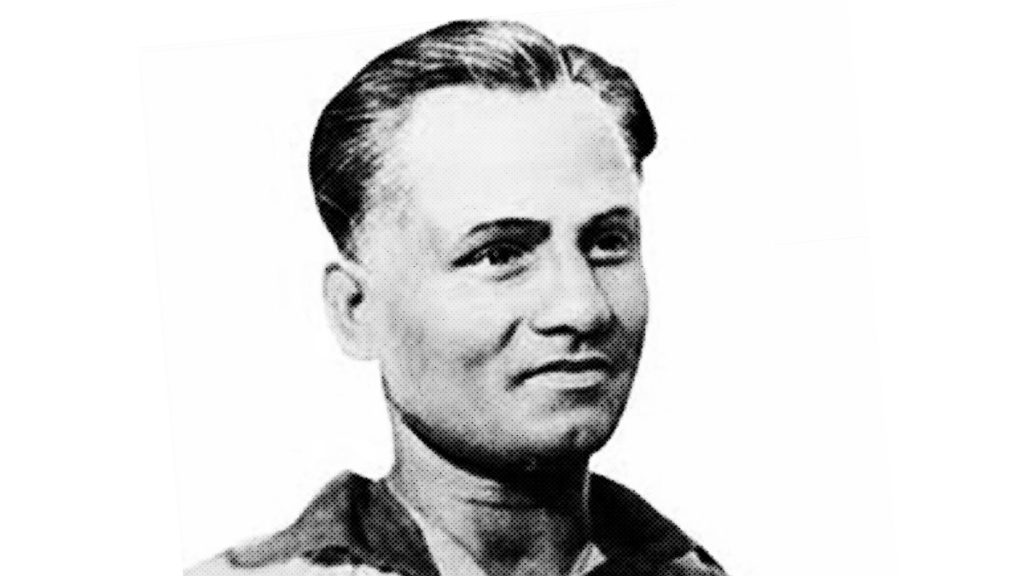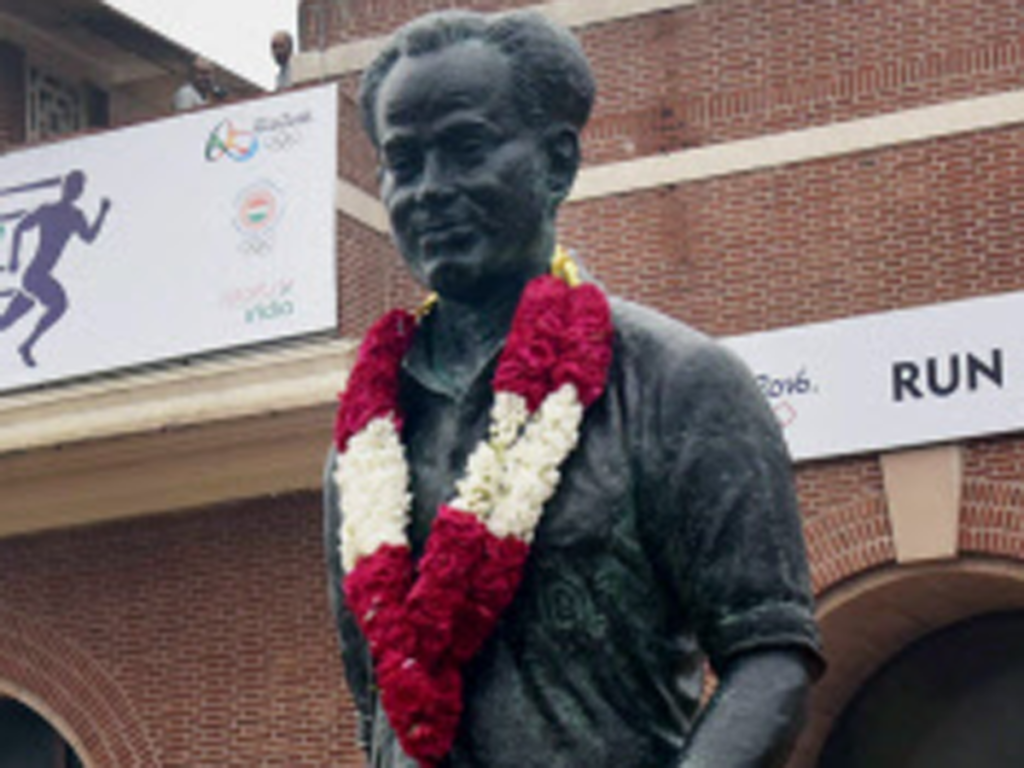Dhyan Chand: The ”˜Kohinoor’ of Indian Sportsmen

By Maj Gen Surjit Singh (Veteran)
Memories of living next to a Famous Neighbour
After the Independence (which we called ”˜partition’, those days) the first peace posting of our father, the late Major Balwant Singh ji was to Meerut Cantt, where we were from late 1947 to mid-1949. The house allotted to us was a hutment on the Grass Farm Road. A few buildings away from us was the house of the legendary hockey wizard, Dhyan Chand (29 Aug 1905- 03 Dec 1979). His achievements are so well known, that I need not recount them here. What I must mention is that within our colony, he lived like any other officer; with no pretence or snobbishness. He had travelled to all corners of the world before the Second World War. During that period, it took forty days to sail from Bombay to the USA and about two weeks to get to Europe. To this, one must add the several days of the train journey to Bombay, and then the wait for the ship.
He carried his three Olympic Gold Medals with utter humility; and extended gracious courtesy to all his neighbours. We were told that Major Dhyan Chand was serving in the Punjab Regimental Centre. The picture which I have in my mind is one of a person of medium height and build. He was not particularly impressive to look at. But on the field, he exhibited infinite energy stored in that average-sized frame. Here is how he looked in the evenings, whenever we saw him.
During that period, I was a seven or eight-year-old kid and knew nothing about what it meant to win an Olympic Gold medal. But when our father got posted back to Meerut in 1955, I was fully aware of his fabulous achievements. During the second tenure in 1955-57, our father was in the Services Selection Board, and I had already set my heart on joining the National Defence Academy. I was in High School and attended the Cantonment Anglo-Bengali (CAB) School which was administered by the Meerut Sub Area. One day, Major Dhyan Chand was invited to visit our school to pep up our sportsmen. He was literally mobbed when he arrived. Everyone was keen to see him, and so a makeshift dais was hastily created for him to speak to us.
Dhyan Chand was no great orator, and he had already retired from competitive hockey. Some of us had seen him play, and even though he was more than fifty years old, his dexterity with the stick was there for everyone to see. At that gathering, he said some things, which did not seem to make much sense at that time. But upon return home, when I jotted down some portions of his ”˜guru mantra’ I saw a great deal of depth in those profound pearls of wisdom. The next day, I showed what I had written to my teacher, and with his help, I cobbled up a small article in Hindi, which was published in the School Magazine. It was written in point form. Many years later, I translated it into English and sent it to some newspapers, and it was well received. I am tempted to share it with you, on the eve of the Tokyo Olympics beginning tomorrow. His ”˜mantra’ was for Hockey players, but I think it can be extended to many other fields of human activity.

THE ”˜GURU MANTRA’ FROM THE HOCKEY WIZARD
The player must NOT question the rules of the game. As far as he is concerned, they were made personally by the Almighty God: and they are good. However, if you play the game very well, or find a place of honour in the Hockey Federation, you might be allowed to comment on them and even make changes, so that the game becomes more challenging to play and exciting to watch.
It is also not for the player to question the position allotted to him in the team. He should be grateful that he has found a place in the team. The position is of no consequence. ”˜Forwards’ are only as important as the ”˜full backs’ and there are matches in which the goalkeeper steals the show!
It does not matter who actually scores the goal. Because, when the goal is netted, the whole team gains. Therefore, do your best to help every player to perform well.
If an opponent is playing well, do not hate or despise him for his skill. You might learn a thing or two from him. And remember, victory tastes sweet only when it is achieved against tough and determined rivals!
Enter the field with courage and humility. Play to win. But if the game goes against your side, remember that it is just a game. Accept the result with grace and dignity. Please note that you have lost only one match. ”˜Insha Allah’ there will be many more occasions to make amends!
Now here are some vital rules, which you must follow when the ball is in play:
· Stay within the zone allotted to you. If you are the ”˜right out’ do not stretch far outside the right strip.
· If the ball is with one of your teammates, position yourself in such a manner that the player who has the ball is tempted to pass it to you. And if the ball is with the opponents, and is in the zone allotted to you, do your best to tackle him, without infringing any rule.
· If the ball is passed to you, or you are able to secure it from the opponents, move towards the goal as swiftly as you can. Run for all you are worth, but as soon as you find that one of your teammates is in a better position to score the goal, pass it on to him. Do not dribble merely to impress the spectators or the selectors.
· Having passed the ball, do not get annoyed or angry with your colleagues if the goal is not scored. Your job ends when you pass the ball.
· Do not waste your breath by shouting words of advice to your teammates. Also, do not run about aimlessly. Conserve your energy for the moment when the ball is passed to you.
· When the match ends, go over the events to learn from the mistakes you made. However, do not run after the press or the selectors. Recognition and fame elude the players who try to chase it!
*
Many years later, when I was going through this piece, it occurred to me that life in the Army or even in the corporate world is similar to playing hockey. Organized activity is more of a ”˜team game’ like hockey or football. It is not an individual sport like tennis or athletics. Many of the above dictums are just as applicable in professional life as they are, on the sports field. We waste too much time quarrelling over the ”˜rules of the game’ and instead of concentrating on the job given to us we run after the people who write reports on our performance. We also spend an undue amount of effort in organizing our postings and appointments, and since we think that we are in ”˜competition’ with our colleagues and predecessors, we do all that we can to run them down. And if something is achieved, we use all means, fair and foul, to prove that no one else had anything significant to contribute for the success of the project. We forget what the wizard said, “Having passed the ball, your job ends. It does not matter, who nets the ball. What matters is that the Goal is scored!”
The Tailpiece
Dhyan Chand lived and played during a period when there were no sponsorships and sports awards. For a living, he had to serve in the Army, and he was with his unit all through the war. Indeed, he performed his military duties to the entire satisfaction of his superiors. I can vouch for the fact that there was nothing in his house, which the others did not have, and the media did not give him any coverage after his retirement from the sport. When he left the army he was only 51 years old, and to support a family of seven children he had to take up a job as a coach. He started his life as a Sepoy and ended up as a Major, with nothing of any monetary value to show for his stupendous achievements.
If the Bharat Ratna is awarded to him at this stage, it will not add even one millimetre to his stature. On the other hand, the prestige of the award will go up enormously! Permit me to recount a proverb,
“Honours and awards distinguish the mediocre. While the superior are embarrassed by them, the decoration itself gets devalued when awarded for lesser deeds”
Short URL: https://indiandownunder.com.au/?p=16734
